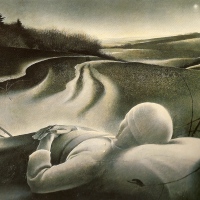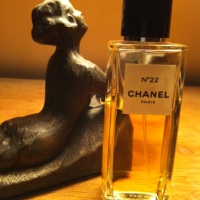“I am a color line.”

Have not posted in a while, so I am sharing a work in progress, working title: “I am a Color Line” which explores my paternal and maternal ancestry, one primarily Chinese, the other Volga German, Irish, Polish, French, Welsh… has gone through a number of iterations, and layers of oil, and I am working on it during snatched moments of weekend or holiday time. It is the visual part of my genealogy research. The title is a nod to the concept of the color line, introduced by W.E.B. Dubois, which he described as the primary place that America needs healing and solutions.

Black Like Me and Racial Ambiguity
 My American grandfather was an unapologetic racist. Pure and simple. I know this because when I was twelve, during a heated conversation at the dinner table, he used the “n” word. I left the table, refusing to eat with him, attempting to disown him. My gentle hearted grandmother Catherine followed me:”Don’t take it so hard. He had some real rough experiences in the south. He was beat up real bad by some colored folks.” Well, gee, I wonder why. There has to be more to that story. Everybody has an excuse for bad behavior. Everybody has a reason for hating someone. For making someone feel like the “other” or “less than.”
My American grandfather was an unapologetic racist. Pure and simple. I know this because when I was twelve, during a heated conversation at the dinner table, he used the “n” word. I left the table, refusing to eat with him, attempting to disown him. My gentle hearted grandmother Catherine followed me:”Don’t take it so hard. He had some real rough experiences in the south. He was beat up real bad by some colored folks.” Well, gee, I wonder why. There has to be more to that story. Everybody has an excuse for bad behavior. Everybody has a reason for hating someone. For making someone feel like the “other” or “less than.”
In spite of or regardless of the racist proclivities of her father, my mom ended up marrying a man from China. A man of color. And, I might add, she put the excellent book by John Howard Griffin, Black Like Me, into my sweaty little bookwormy adolescent hands one summer. Thank you Mom. A thousand thanks. Have you read this book? If not, I urge you to put down what you are doing and find a copy.
It starts out like this:
“For years the idea had haunted me, and that night it returned more insistently than ever. If a white man became a Negro in the Deep South, what adjustments would he have to make?What is is like to experience discrimination based on skin color, something over which one has no control?”
Published in 1960, Black Like Me details the experience of a white journalist who was so consumed with the above question that he sought the advice of a dermatologist and temporarily altered the pigmentation of his own skin through radiation and medication treatments designed to alleviate vitiligo (a disease that causes loss of skin pigmentation). Following these uncomfortable treatments, and augmenting his new identity with makeup and a shaved head, Griffin proceeded to travel through various cities in the south, beginning with New Orleans.
By the end of his story, we learn that once Griffin’s journey is complete, chronicled and widely shared through public media, Griffin and his family become targets of hostility within their own hometown of Mansfield, Texas. This leads to their eventual decision to sell their homes and move to Mexico. They had to LEAVE THE COUNTRY to escape the repurcussions that arose from simply shining a light on racist conditions that existed in the segregated south. After receiving thousands of letters, the author concluded that many conscientious white citizens were more fearful of their racist neighbors than anything else. He also includes poignant anecdotes of his encounters with black individuals he met along the way, most who were deeply committed to forgiveness, determined that the proper response to racism is love, not hate. That the way to change is through peaceful, legal channels.
As I re read this book today, while so many of us grieve over lives tragically lost in South Carolina, with the Confederate flag waving high and proud over the state’s capitol, I ask myself, what has changed during my lifetime of half a century?
Within our own home, my family has always lived in a state of racial ambiguity and blurred racial identity. We have ancestors from China, Japan, Germany, France, Wales, Poland, Ireland and Russia. That we know of. My husband’s adoptive daughter is of Black and Japanese heritage. I have uncles who each fought on opposite sides of the Korean War. My daughter, a new graduate with a degree in anthropology, asserts that race is a myth, a concept that is not supported by biological science, but is rather, a cultural construct, determined by an individual’s physical appearance. But even this mere categorization doesn’t account for the hatred, the scorn of other, the assertion of superiority or inferiority of one category to the other. It’s all so deeply troubling.
This morning I listened to the statements made by families of those who were slain at the African Methodist Church in Charlestown. I couldn’t help but weep as I listened to their sincere expressions of grief that were interwoven by the commitment to forgive, to not return hate with hatred but with love. I am thoroughly in awe of them.
I sit here and wonder how long it will take for a real change of heart to occur. My dad would say, “It’s up to you kids now, to change the world. ” He said that on his deathbed, toasting my daughter and her collegiate cohorts. “ What I’d give to have my future ahead of me, “ he said, “ But I had my time, now it’s your turn. The future is up to you!”
That shooter at the church was only 21 years old. Our country, our world is crying out for healing. And it is days like this that I miss my kind-hearted, felonious miscegenistic parents something fierce.
 Images:
Images:
Georgia O’Keefe cloud painting in stairwell at Chicago Institute of Art
Photo of Mom and Dad on a date in the late forties, also in Chicago.
Happy Birthday Serenade
 Today would have been Dad’s 93rd birthday so I thought it fitting to post something in honor of that. I haven’t yet allowed myself to finish reading his journal, but today I found passages he wrote during the time when Mom had a serious relapse and was hospitalized or in a transitional home for more than 50 days. (He kept count in his diary of the days they were apart.) She had come home for a visit and he had put on a music show featuring songs they loved during the fifties and sixties. As he tried unsuccessfully to get her to smile, he wrote, they began singing, Chances Are…, Stranger in Paradise, Smoke gets in Your Eyes, and Just Remember You Belong to Me…
Today would have been Dad’s 93rd birthday so I thought it fitting to post something in honor of that. I haven’t yet allowed myself to finish reading his journal, but today I found passages he wrote during the time when Mom had a serious relapse and was hospitalized or in a transitional home for more than 50 days. (He kept count in his diary of the days they were apart.) She had come home for a visit and he had put on a music show featuring songs they loved during the fifties and sixties. As he tried unsuccessfully to get her to smile, he wrote, they began singing, Chances Are…, Stranger in Paradise, Smoke gets in Your Eyes, and Just Remember You Belong to Me…
Dad wrote: ” Being from an oriental upbringing, I didn’t even know how to wear a “silly smile” but miraculously the singer was serenading for me at last.”
I don’t know. How did he endure it? Those years when mom was not well, when the illness took over and she felt nothing but mistrust and suspicion of him? How did he keep his heart so continuously faithful and even hopeful? One passage in his journal describes a moment of reprieve when Mom embraced him and said the words: ” I trust you.”
“The nightmare is over!” He wrote in relief. Only to have the next entry begin with the words, “Alas – not so fast…” when she relapsed back into her paranoia. But he stayed the course for sixty years and seemed to adore her to the last day. I write these things because I think we all want to believe in lasting love and fidelity. I know I do. I write this because I don’t want to forget that I witnessed it live.
Maybe this journal entry is part of his secret to being able to love all those years:
 Hey Dad, here is a song for you and Mom, modernized a bit. Hope you don’t mind. Love you lots. Happy Birthday and Happy Day of the Dead.
Hey Dad, here is a song for you and Mom, modernized a bit. Hope you don’t mind. Love you lots. Happy Birthday and Happy Day of the Dead.
Intercontinental Blind Date
They met on a blind date in Chicago in 1950 arranged by their roommates, who were mutual friends. He hailed from Shanghai, China, and she, from the Land of Oz, Topeka, Kansas. Dad told me that when he met Mom, he immediately wrote home to break the news: he had fallen in love with a woman who had the eyes and the smile to rival the popular actress Vivian Leigh. As a little girl I loved looking at old photos of Mom. Her eyes truly were striking, a sea glass green fringed with lashes of ebony. Her dark hair fell in waves against her pale complexion. She had what I have heard referred to as the coloring of the ‘Black Irish’ and made one think of fairy castles. Not very tall, she liked to think of herself as ‘pleasantly plump.’ She was, and still is, an undeniable beauty.
Dad was a serious, scientific fellow who made his way to the states with the hopes of his parents behind him all the way. That was in 1946. Dad never made it back to China in time to see his parents alive. The Communist revolution was brewing, and his concerned parents sent him encouragement by mail to make the best of his life in America. Both university educated, they sternly instructed their son not to even think of marriage until he could support his wife and family sufficiently.
“Send your wife to school. Intellectual life is very important for a woman. Make sure she is happy,” his mother scolded. “Take care of her. Do well.”
Their first real date was to a flower show. Mom lived at the Eleanor Club in Chicago, a residence for single working women. She worked at Marshall’s Department store doing filing. Just before she died this past spring, I was sampling some Fracas perfume given to me by a friend. Mom’s reaction was instantaneous: “The Eleanor Club! That’s the smell that greeted me when I first moved in. I’ve been looking for that fragrance all these years!” I like to think of those working women, spritzing Fracas by Piguet, their affordable luxury, creating everyday beauty for themselves.
In those days the women adhered to curfews, strictly enforced by a supervising house mother who saw to it that the “girls” had no male visitors in their rooms or callers at inappropriate hours. Dad told me that at first Mom wouldn’t go out with him but he wouldn’t give up. Once his persistence paid off, he endured regular disdainful looks from the house mother at every date. Even though he was educated and working as an engineer, this was the 1950’s and interracial relationships were frowned upon. Dad had pretty thick skin and a cosmopolitan upbringing in the French Quarter of Shanghai, where he was used to seeing individuals from all over the world. Growing up, I don’t recall ever hearing derogatory comments about other races or cultures from either of my parents. though our family was on the receiving end of them often enough.
Dad often told me he loved the way my mother enjoyed life. How she could laugh. He loved to see her smile. I think he felt that she warmed him, infused his sober self with some gaiety. Early black and white photos show Mom laughing, her entire face open and joyful. Dad looked darkly suave with his American Beauty on his arm. Theirs was a proper, old-fashioned engagement that lasted nearly two years. When Dad landed a job in New York City, he ended up renting two apartments so that Mom could follow him there and keep to the rules of what was considered decent until they were properly married. They had a small ceremony at city hall in Manhattan in February of 1952. Born Wei Lim, Dad became William, and took Dolores to be his wife.







